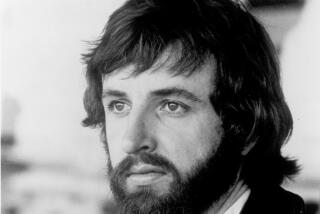‘Jesse’ Studies Helms, His Appeal to Voters
- Share via
At the beginning of “Dear Jesse,” documentarian Tim Kirkman lists all that he and the senator from North Carolina have in common as if he were writing Helms a letter: They were both born in Monroe, N.C., raised as Southern Baptists, attended Wingate University for one year and were interested in journalism.
Then he concludes, “But I believe we have a more significant similarity--for most of your 24 years in the U.S. Senate you’ve been obsessed with homosexual men; for most of my adult life, so have I.”
Kirkman left North Carolina in 1990 for New York. Six years later, fleeing an exceptionally bitter winter and a breakup with his lover, Kirkman decided to pack his camera and discover whether or not another North Carolinian, Thomas Wolfe, was right about whether you can go home again. Kirkman found that he could, at least for a visit, and that his timing was good, as Sen. Helms was running for office again.
During that campaign Kirkman and his cinematographers pointed cameras and mikes at a wide range of people, and we’re reminded of why Helms has earned the nickname “Senator No.” He’s anti-gay, anti-AIDS funding, anti-abortion, anti-funding of the arts, and at the beginning of his career, anti-integration. What he’s for, everyone reiterates, is tobacco and big business.
Time and again Kirkman discovers that what keeps Helms in office is that people, even those who admit they do not agree with all his reactionary views, believe they know where he stands; he strikes them, rightly or wrongly, as that rarity in modern times, an honest politician. Novelist Allan Gurganus, who returned from his own New York sojourn to resume living in his native state, says, before expressing how much he deplores the man, that he credits Helms for being “hard-working, proud of his state, and he does what he says he’ll do.”
Kirkman reveals that his beautiful native state is also home to lots of admirable, creative people who are trying to make North Carolina a better place to live for all people, young and old, white and black, gay and straight. Several of the people Kirkman talked to are especially moving--a white woman, for example, who adopted a baby of mixed parentage, whose parents were HIV-positive drug addicts but whose child proved miraculously free of disease. She tells of taking the boy, now a toddler, to church and encountering racism from a child who looked to be no more than 4 years of age.
Also heart-rending are two elegant middle-aged women, both of whom lost their sons to AIDS and who have founded MAJIC (Mothers Against Jesse in Congress). By chance Kirkman encounters his junior high school principal, a black man who, with a sense of bemused resignation, predicts Helms will die in office.
Note: After Matthew Shepard was killed recently in a gay-bashing incident, Kirkman realized he had interviewed the University of Wyoming student for his documentary while Shepard was enrolled at North Carolina’s Catawba College. Culling his outtakes, Kirkman found the footage, in which Shepard stated he did not believe that Helms represents the feelings of North Carolinians toward gays. Kirkman has appended this two-minute sequence as an epilogue to “Dear Jesse” in memory of Shepard.
* Unrated. Times guidelines: adult themes.
‘Dear Jesse’
A Cowboy Booking International release. Writer-director Tim Kirkman. Producer Mary Beth Mann. Executive producer Gill Holland. Cinematographer Norwood Cheek, Ashley McKinney. Editor Joe Klotz. Music John Crooke. Running time: 1 hour, 22 minutes.
Exclusively at the Nuart Saturdays and Sundays at noon through Nov. 15, 11272 Santa Monica Blvd., West Los Angeles, (310) 478-6379.
More to Read
Only good movies
Get the Indie Focus newsletter, Mark Olsen's weekly guide to the world of cinema.
You may occasionally receive promotional content from the Los Angeles Times.










